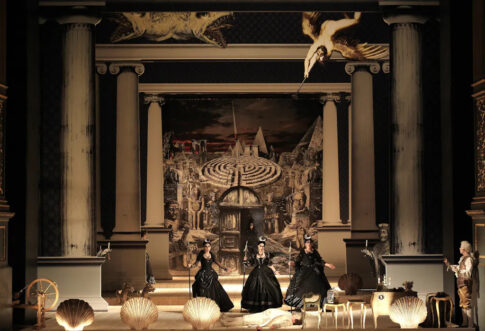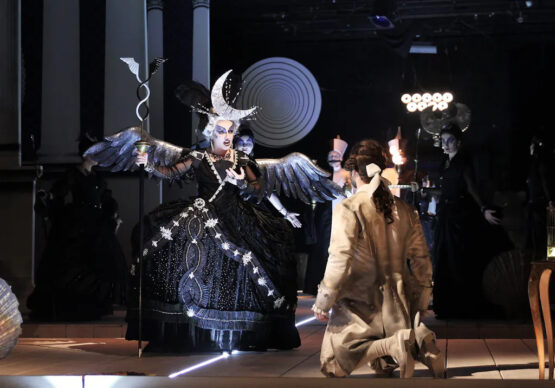 Czech Republic Mozart, Die Zauberflöte: Soloists, Prague Children’s Chorus and Acrobatic group Long Vehicle Circus, Chorus and Orchestra of the National Divadlo Theatre / Jaroslav Kyzlink (conductor). Estates Theatre, Prague, 13.4.2025. (GT)
Czech Republic Mozart, Die Zauberflöte: Soloists, Prague Children’s Chorus and Acrobatic group Long Vehicle Circus, Chorus and Orchestra of the National Divadlo Theatre / Jaroslav Kyzlink (conductor). Estates Theatre, Prague, 13.4.2025. (GT)

The city of Prague has long been connected with the composer – and particularly with his final opera – Die Zauberflöte was performed in 1792 at the Nostitz Theatre (renamed as the Estates Theatre). So popular, that it has never been out of the repertoire in the Czech capital.
Vladimir Morávek’s production was first staged here in February 2015 and has attracted full audiences ever since. The director has often invited controversy in his career – his production of 1789 or Perfect Happiness by Ariane Mnouchkine led to fighting outside the National Theatre, and his credo is: ‘If someone throws a bricks-and-mortar theatre at you, throw an alternative one back at him’. Yet much of his work has met with success; his first staging in 1980, in Brno, was based on Joe Orton’s diaries, and among other notable stagings have been his Nights of Antelopes, which won the Literary Fund Award in 1998. His debut opera productions were Tosca and Macbeth at the National Opera in Prague, and his Turandot was well received in Gothenburg. He has also worked in cinema with Bored in Brno, which was awarded five prizes at the Czech Lion Awards. Presently, Morávek is the artistic director of the Husa na provázku Theatre in Brno.
Throughout his career, Morávek has collaborated with the designer Martin Ondruš and the artist Miroslav Huptych. In this production, they created a fantastic and magical showcase – presenting a variety of colourful backdrops – influenced by the Middle Ages, Heironymus Bosch and more recent surrealist imagery (hinting at Terry Gilliam’s artwork for Monty Python). Huptych is also a popular poet and has worked with drug addicts in art therapy projects. The sets were minimalist, with a chair and writing desk constantly on stage – emphasis was given to the movement between the frequently changing scenes. Morávek’s conception elevated the opera from a singspiel to a more attractive, life-enhancing story – Leona Qaša Kvasnicová’s choreography introduced a crucially important element. She has worked widely in both Czechia and Europe, working on successful stagings, such as Vivaldianno, Galileo, and TV shows and pop shows. Tomáš Kypta’s beautifully designed costumes were overwhelmingly monotone, dominated by black and white, and in the period of the eighteenth century.
Of the singers, the Tamino of Petr Nekoranec was excellent in characterisation and voice; he has a strong, vibrant tenor, while Markéta Klaudová’s Pamina was outstanding and perhaps the finest female voice of the evening. Papageno’s opening aria, ‘Der Vogelfänger bin ich ja’ was delivered with a delightfully comic charm- Jiří Hájek’s portrayal was often comical, yet sometimes tragic. The outstanding singing and acting of the evening was from Diana Schnürpel as the Queen of the Night, and she was imposing with her stage presence, opening with her superlative opening aria, ‘Du wirst sie befreien gehen’ in Act I. Her second aria in Act II, ‘Der Hölle Rache kocht in meinem Herzen’, was even more impressive in her lust for power and amazingly shown by her high-reaching coloratura.

Impressive too were the Three Ladies from their first entrance, imposing in their black dresses and all in great voice, especially in the comical quintet with Papageno and Tamino, ‘Hm! hm! Hm!’. Of the other ensemble scenes, that of Papageno and Monostatos, ‘Bei Männern, welche Liebe fühlen’ was charming in their common searching for love. The Sarastro of Pavel Švingr was impressive with his darkly hued bass voice – another striking portrayal. The orchestra adopted period style and was impressively led by Jaroslav Kyzlink, with expressive contributions from the trombones, flute, and percussion, while the choral singing, and especially the members of the childrens’ chorus, both on and off-stage, was outstanding.
There was a novel use of lasers beamed across the stage during the masonic ceremonies and rituals. Pyrotechnics introduced dramatic changes in the narrative which were equally ostentatious and demonstrative. The frequent switching of scenes ensured the storyline maintained the dramaturgical momentum, and among other interesting effects were the children running across and followed by animals, elephants, frogs, and lizards making their way across the stage during Act II. A unique feature was the appearance of both the adult Mozart, and the young boy Mozart who made strange appearances at different times. A visually attractive moment was the acrobats of the Long Vehicle Circus entrance in Act II, adding to the colour and splendour of the whole show.
In all, Morávek’s staging conveys the search for a fairy tale concept rather than a singspiel comedy, and his collaboration with such fine artists and theatre designers ensured this production reflects a resounding success. Throughout, the audience was entertained equally by the singing, the theatrical movement, and the introduction of innovative trickeries during the opera. It is hardly surprising that this staging of Mozart’s Die Zauberflöte gets sell-out audiences ten years after its first performance in Prague’s Estates Theatre – a remarkable triumph for the National Theatre in Prague.
Gregor Tassie
Production:
Director – Vladimir Morávek
Sets – Miroslav Huptych, Martin Ondruš
Costumes – Tomas Kyptov
Choreography – Leona Qaša Kvasnicová
Chorus director – Lukas Kozubik
Dramaturg – Beno Blachut
Cast:
Tamino- Petr Nekoranec
Pamina – Markéta Klaudová
Queen of the Night – Diana Schnürpel
Sarastro – Pavel Švingr
Papageno – Jiří Hájek
First Lady – Tamara Morozová
Second Lady – Stanislava Jirka
Third Lady – Jana Sýkorova
Papagena – Zuzana Kos Kopriková
Monostatos – Ondřej Koplik
First Man in Armour – Jan M. Hajek
Second Man in Armour – Ivo Hravhovec
Mozart – Ondrej Mataj
Five geniuses – Prague Philharmonic Children’s Choir
